Why Another Mindfulness Article??
Studies have been done, books have been written, leadership and business coaches preach it…. Why write even one new word on mindfulness and leadership?? Or business growth and mindfulness??
Most articles omit how elementary and foundational mindfulness is to thriving in any arena of life. It’s not just “another” leadership virtue. Many small business leaders don’t believe mindfulness is more important than communication or any other leadership skill. Unfortunately, it is, and by a large margin. More than 80% of top business leaders meditate or practice some form of mindfulness. Also less well understood are the practical and powerful benefits mindfulness confers that undergird and enable many other skills and aspects of leadership.
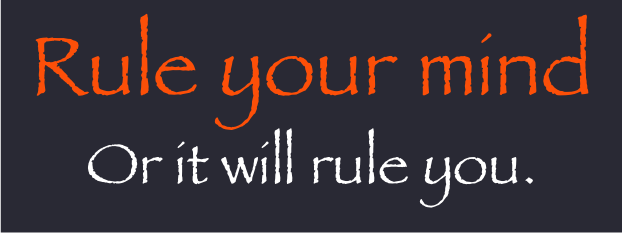
This first article in a three part series on leadership and mindfulness will deeply explore the basic existential predicament we (all humans) find ourselves in, and how mindfulness can generally help. Part two will look at how mindfulness specifically fixes what ails us, and how it can inculcate traits beneficial to leaders and business owners. Part three will apply the first two articles to common leadership scenarios and mistakes, weaving in real life stories.
Who We Are and Our Predicament
All human beings have remarkable attributes which (apparently) distinguish us from all other forms of life on the planet. Self-awareness, time awareness, imagination, speech and language, abstract thinking, cognitive biases are all unique to humans, and were beneficial in a world which presented daily threats to survival. They optimized the prospect of reproduction, which is the whole focus of evolution. In the modern world, however, many of these traits are far less critical. Health care, social structures, control of our immediate environment, etc., have all but eliminated survival threats and have allowed most human beings to easily reach reproductive age. Evolution has therefore slowed tremendously (no-one is getting weeded out of the population), and the traits of our species have changed very little since primitive times.
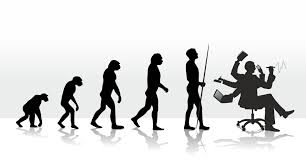
Why is any of this important? Because traits which optimized our survival as early humans – and which are still with us — can work against us in the 21st century. And they do. We now care much less about surviving and care more about thriving: happiness, social satisfaction, financial success and other non-survival oriented outcomes. None of which evolution cared about in our formation as human beings. But it’s worse than our evolution-forged traits being inconsequential. Many of the basic traits which served you well 200,000 years ago are now compromising your emotional intelligence, your equanimity, your resilience, your decision-making, your communication, and other critical leadership skills. But how?
Negativity Bias
Let’s look at one example, negativity bias. It’s one of the most basic of over 150 catalogued cognitive biases that all human beings possess. It works by harshly prioritizing and imprinting negative experiences over positive ones. Our memory and neural circuitry attach to negative experiences like Velcro, and positive ones slide off like Teflon. In the moment, a negative experience can generate the fight-flight response (stress, fear, anxiety, etc.). In the longer term, a negative experience is recalled more readily than a positive one. This imprint and recall phenomenon was important because if early humans escaped negative experiences like a bear attack, the imprint allowed for learning and future avoidance. Much more valuable than remembering the taste of blueberries, for example (positive).
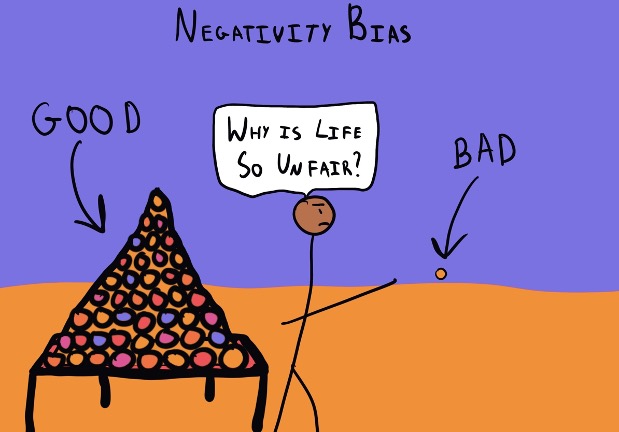
In the modern world, survival threats like a bear attacks are very uncommon. Unfortunately, the part of our brain (limbic system, and specifically the amygdala) which generates the response doesn’t know that. The result is that our brain is co-opted by NON-survival threats – like public speaking or an argument with a co-worker – and generates the same fight-flight response. This is what is known as the “amygdala hijack”. We get stressed from thoughts and external stimuli that are disproportional to the survival threats on which evolution focused. The ensuing symptoms compromise happiness, leadership, social interactions, and other critical human experiences, both short term and long term. We’re still a ways from how business growth and mindfulness are connected, but keep going.
The Real Modern Threat — Why Our Predicament Matters
The example of a bear attack and fight-flight is just one stimulus-response example, and not a good one for the 21st century. Today our performance and experiences can be compromised by a wide variety of stimulus-response pairs. The stimulus could be a bad memory, someone cutting in front of us in a grocery line, a traffic jam, death of a friend, challenging market conditions, a difficult conversation, etc. The response could be anger, sadness, resignation, feelings of low self-worth, confusion, anti-social behavior, a bad decision, etc. The architecture is always the same, though. An internal or external stimulus encourages a response which is counter-productive.
Over time, our cumulative experiences, combined with our cognitive abilities — memory, generalization, abstract thinking, past and future awareness — create persistent cognitive patterns and behaviors. We develop cognitive background noise or “monkey mind”; thoughts arising constantly that can pre-dispose us to certain behaviors or emotional states. We don’t choose these thoughts and are typically only half-aware or unaware of them. The outcomes they produce interrupt our focus on what’s right in front of us. If you have a difficult commute and face heavy traffic every work morning, you might get depressed or frustrated before you ever get into the car. Your memory (stimulus) activates feelings (response), and you might spend your commuting time wishing you were somewhere else. If you think you’re immune to “monkey mind”, try to sit quietly and think of nothing for two minutes.

Enter Mindfulness
Mindfulness practice addresses this universal condition directly. We can define mindfulness as the non-judgmental awareness of both internal and external experience in the present moment. Characterized by relating to one’s experience (and, incidentally, others) with openness and acceptance. For most people, mindfulness is a cognitive skill which requires regular practice, and meditation is a concentrated practice to develop mindfulness.
The intent of mindfulness practice is to build awareness of the content of our background noise, and how it interrupts our focus on the present moment. With practice we begin to recognize the external stimuli or internal thoughts that give rise to our responses, good or bad. We learn to see the space in between stimulus and response, enabling us to be intentional with our responses rather than reflexive. Becoming familiar with the constant cycle of distraction and focus, we can learn to return more quickly to the present moment. Over time, mindfulness quiets the background noise described above. When we are fully mindful (present) the background noise evaporates. Mindfulness is both a practice and an experiential state. What are the related social, cognitive, and emotional benefits?
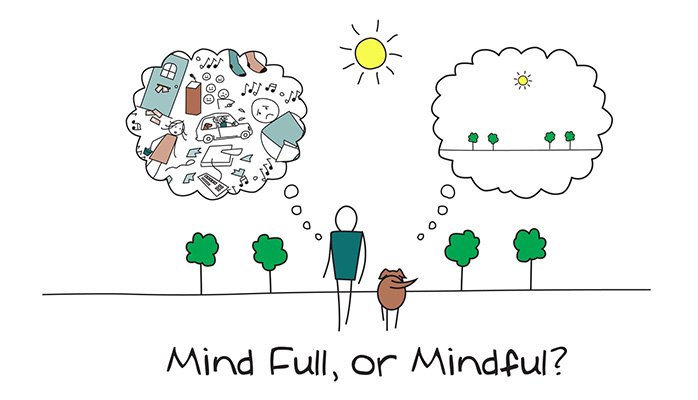
Social, Cognitive, and Emotional Benefits
- Improved mental clarity and memory
- Stress and anxiety reduction
- Stronger creativity and imagination
- Emotional resilience and equanimity (regulation and reduced reactivity)
- Relationship enrichment
- Many other desirable outcomes directly related to human happiness and performance
The best cognitive science has and does endorse these claims. All of these benefits lay the groundwork for upgraded work behaviors, like delegation or managing being overwhelmed. The connections between leadership and business growth and mindfulness become more obvious.
Although mindfulness directly addresses basic obstacles to a quality life, it’s not a panacea. It is best accompanied by other health practices like nutrition, exercise, psycho-therapy, etc. Finally, the experience and feedback loop generated from mindfulness is more important than the theory. Both can help shape an effective practice, but there’s no substitute for experience. Hence, “mindfulness practice”. Your might improve your tennis game by reading about it, but playing is more important.
Conclusion
Finally… aren’t we messing with our biological and evolutionary heritage if we practice mindfulness? Isn’t it “unnatural”?
Apparently, but not really. Our traits and how they are expressed are two different things. Many human enterprises already either explicitly or implicitly emphasize how certain human traits are expressed, suppressed or managed. Social learning, technology and other environmental factors have shaped (or conditioned) us into beings which either thrive or suffer in the modern world. Cell phones and social media provide examples of powerful influences on who we are and how we behave, for both better and worse. As complex organisms with higher order capacities, we have the ability to recognize, develop and variably express innate traits which enhance our existence, and manage innate traits which can lead to unwanted expressions. These higher order abilities are precisely our evolutionary heritage, and therefore using them is not at all unnatural. We are simply leveraging and shaping our traits – and how they are expressed — to align with our environment.
Parts two and three of this series will explore how leadership and business growth and mindfulness are specifically connected.
Chip Carter, Co-Founder of Summit Business Growth
chip@summitbusinessgrowth.com
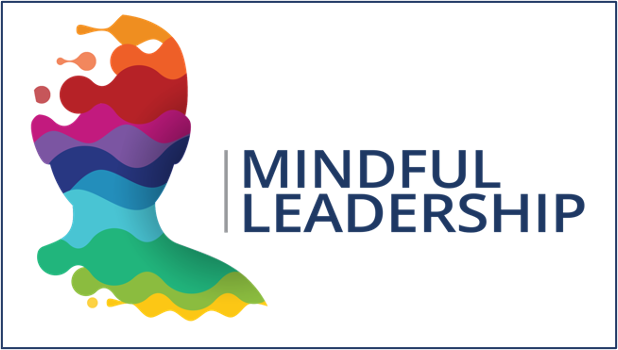
0 Comments